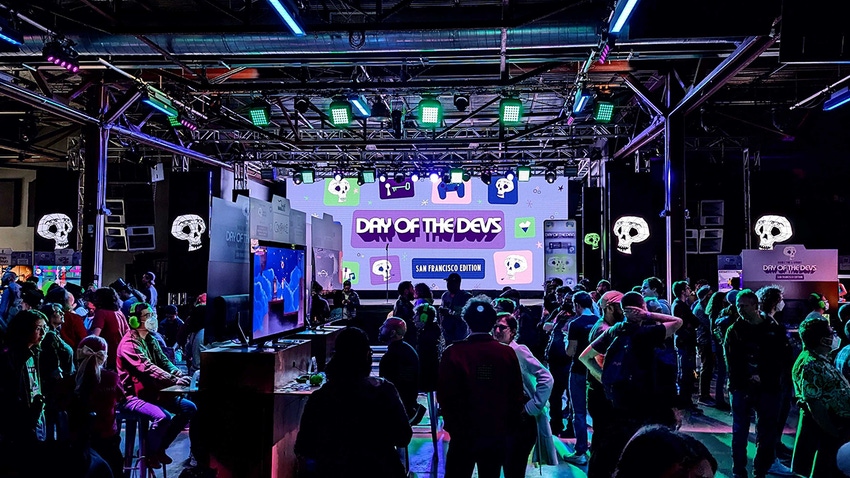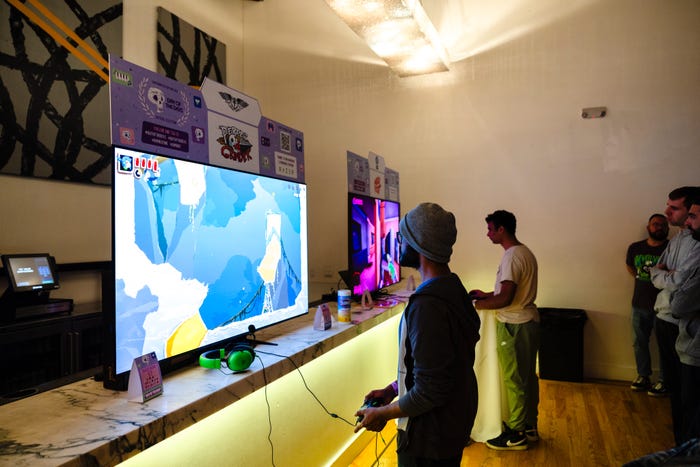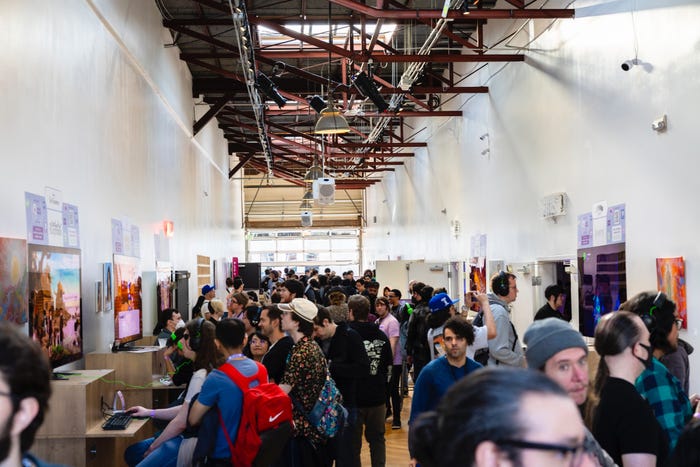
Read More from GDC 2024 | Keep up with the latest game industry event coverage from GDC 2024, including news, talks, interviews, and more from the Game Developer team.
We asked indies at Day of the Devs how to survive the game industry hellscape
Stay lean, make games with your heart, and steal from the best.

It's a radiant day in San Francisco, and I am surrounded by indies. You can't turn a corner in The Midway without locking eyes on the most fascinating, offbeat morsel of interactive media you've seen since all of two seconds ago. The talent on display at the latest edition of Day of the Devs is electric and inspiring, and for a few glorious hours in the California sunshine, you'd be forgiven for thinking the game industry has finally reached nirvana.
It hasn't, of course. The world of video games continues to treat developers big and small like interchangeable components in a dystopian corporate machine. Funding cuts, widespread layoffs, project cancellations, and the perplexing notion that video games should be made to appease shareholders rather than spread joy have decimated the game industry of late. It's evident that developers are growing weary of those debilitating trends, but how can the smallest teams in particular weather the storm in the hope of witnessing a brighter future?
We asked those exhibiting at Day of the Devs for their own personal survival tips. Here's what we learned.
Stay lean, move fast, scope efficiently
"Make something really small with as small of a team as you can, so that you don't have to do as well for it to be considered a success," explains Gourdlets developer Preethi Vaidyanathan (a.k.a. AuntyGames).
She's not the only one who feels smaller is mightier in the current climate. Alastair Low from Lowtek Games tells his peers to "keep it lean" and believes solo devs and smaller studios might find it easier to meet deadlines because there's more direct accountability. Bigger teams, he feels, can get away with kicking the can down the road to a certain extent.
Santa Ragione programmer and designer Stefano Sanitate broadly agrees. "Don't overscope your game," he says. "Do your best to try and go small and grow steadily. Everyone wants to achieve the perfect game, but firstly you don't have the resources, and when you think you have the resources, you don't have the time. Just be honest with yourself and look around at the context. The industry is in kind of bad [place] right now."

Image via Day of the Devs
In many ways, this was the theme of the day. Maria Aloupi, co-founder and producer at Beyond Those Hills, suggests indies need to find a way to tap into a market while the iron is still hot. For her, that means taking charge of your own destiny by self-publishing. But that's largely because she feels it provides flexibility in an increasingly unstable industry. "As an indie you need to find a market fit to test your ideas to see if there's room for you," she says, noting the next step is to move as quickly as possible. "You know, if you decide something now and finish it in five years, the market will be completely changed."
Be pragmatic and keep your 'heart warm'
It's okay to struggle, but only if a project makes your "heart warm" is the advice from Core8 co-founder Chikako. She explains the three-person Japanese studio has been trying to put the spotlight on their upcoming title, Wonder Wander, for what feels like an eternity but has faced "so much rejection." When asked how they handle those setbacks, she explains the team keeps going because they "simply love what we are doing."
"As long as we're here, standing on our own two feet with a roof [over our head], we're just fine. It's kind of a balancing act and you need to ask what you're looking for from life." She says that making video games is everything for many indie devs, but suggests creators also need to strike a balance between working on their project and ensuring they have their needs met outside of the game industry.
"Developers have to think about what kind of life they want to have," she continues, emphasizing that preparing for the struggle means believing in yourself, while also ensuring you have the resources and pragmatism required to handle the inevitable rejection you'll face on your journey.
Publishers want demos and audience insights
Donna Chen, marketing lead at indie publisher Thermite Games, says that when pitching a publisher, it's vital you have a gameplay demo that effectively answers the question: "Who is this for?"
For instance, she explains everyone on the Thermite team must be able to take prospective projects for a spin. "We like to get our hands on the game to get a sense whether it's compatible with us."

Image via Day of the Devs
As for what that demo should look like, Chen says it's important the core loop is fun even if the rest is incredibly rough. "Your art style doesn't need to be exquisite, but [the demo] needs to communicate your vision," she continues. "A fun game doesn't need to be appealing for everyone, but you need to really hook people and know your audience."
In short, when you're walking through the door to pitch at Thermite (and other publishers), you already need to know who you're targeting and what makes them tick. Does that mean getting a publishing deal will be a piece of cake? No. But hopefully it'll improve your odds.
All feedback has value
SOPA developer Juan Castañeda of StudioBando wants indies to understand there's no such thing as bad feedback. In searching for ways to make SOPA a reality, he spoke with hundreds of publishers and investors but initially received "no after no." Eventually, the team found a "great partner," but he explains that onslaught of rejection actually became one of StudioBando's greatest assets. The team learned how to leverage all the feedback (both positive and negative) they received and relate it back to their "core vision."
Looking back, Castañeda says that despite doing research and taking a targeted approach to pitching–the company generally approached publishers whose catalogue "shared themes" with the type of game it makes–those meetings didn't always go to plan.
"Sometimes you're actually quite surprised by the feedback that you get from publishers in your genre. The mismatch of expectations there can be huge," he says. "In fact, we got feedback from one of our idols–and I can't say their name–but it was really surprising to us. It was really counterintuitive in the sense they were trying to take the game in a direction that wasn't even in line with their own work."
Instead of disregarding what they considered to be paradoxical advice, the team worked to understand why their pitch had elicited that response. "We tried to go back and address the feedback in a different way," he adds, noting that even through the team didn't implement the suggestion of almost "changing the genre," they still felt compelled to unravel why a publisher they admired felt that way. He believes moments like that can be revelatory.
In this instance, it taught StudioBando their project might not actually connect with a certain type of player, which he notes is "totally valid," giving them the confidence to walk away from that specific target market. In short, he claims unpacking and assessing feedback in all of its forms could help you mitigate risk, and that's a huge win when you're working with limited resources.
Be smart and steal
In a rather candid exchange, Triband creative director and co-founder Tim Garbos sounded off about the creative benefits of daylight robbery. The What The Car? And What the Golf? developer says your first plan of attack as an indie should be to "make a bunch of games" and see what sticks, and recalls how the studio was working on a (now-scrapped) project before committing to What the Golf?. He explains the team ultimately focused on the latter because it just worked "so much better."
He also has another piece of device for developers panning for creative gold: steal from your peers. Pointing to What the Car? as an example, he reveals "every game mechanic in this game [already] exists in a different game, we just made it about a car and put them all together."

Image via Day of the Devs
It's evident Garbos wants indies to be unafraid (and unashamed) of standing on the shoulders of giants. Development is an iterative process across the entire industry, so don't be scared to expand on the work of your peers and wear your inspirations on your sleeve. "The longer you spend [in production], the more risk you take on and the more money you need to earn back," he adds, imploring devs to work fast and work smart.
Diversify your income
Having a fallback or two is solid advice in an industry this volatile, but there's a sense that for many indies, every project feels make or break. Kind Words developer and Popcannibal co-founder Ziba Scott explains there's no shame in taking on other work to make ends meet, and believes too many indies are smitten with the idea of all or nothing development.
"There's sometimes in the indie world too much pride in being full time solo," he says. "There are so many other things you can do with your life that pay better than video games, and there's no shame in doing more than one thing with your life.
"Even if you stay in games, there's still contract work that can be a great joy. Working on a game that's not yours can be a stable source of funding. I've been doing this for 13 years as an independent, and there were many times I did contract work. When I started I was a landlord, also. There's no extra points for going all-in on 'I'm only going to live off the games I've made,' because that's pretty damn hard."
Discussing past contract gigs, Scott explains he worked on a diverse array of projects, including an academic game funded by a northeastern law school that had to teach players how to better represent themselves in court. "The law school had to pair with game developers to put together a pamphlet's quantity of information into a little point-and-click that would be released publicly on the web," he adds. "It was really fun."
It's a niche project but one that indicates the array of work that's available beyond the traditional confines of indie development. And crucially, it's work that pays.
Read more about:
GDC 2024About the Author(s)
You May Also Like









